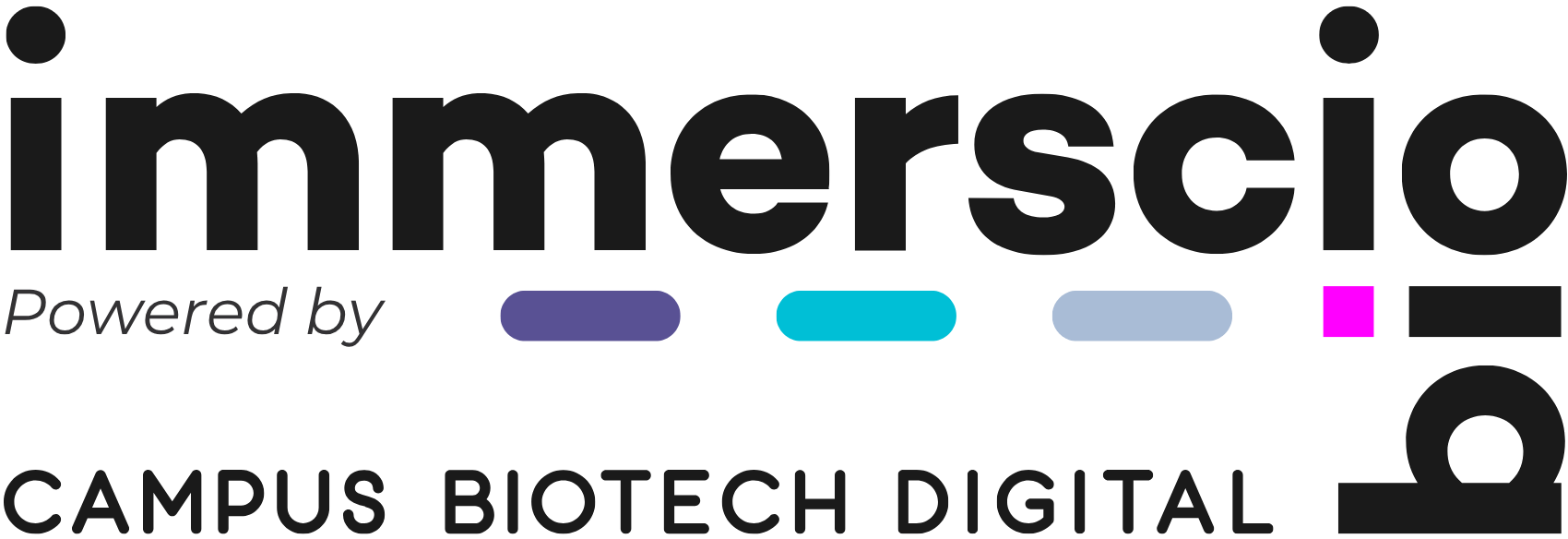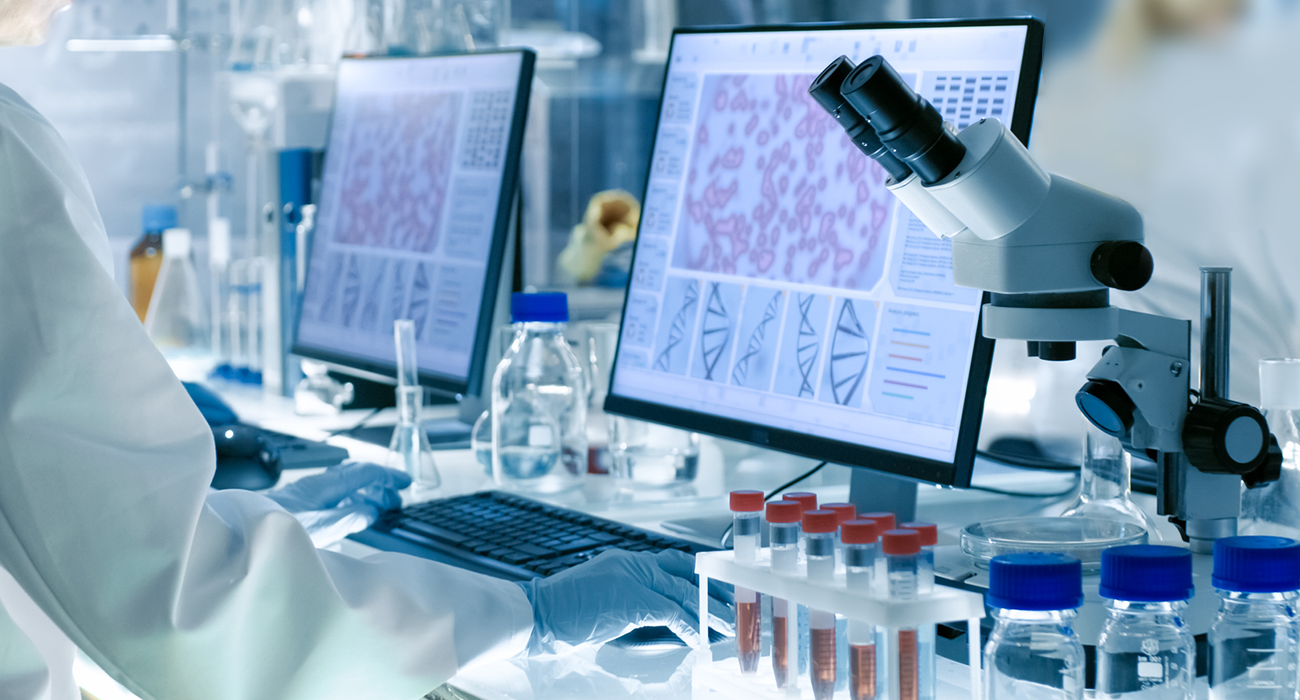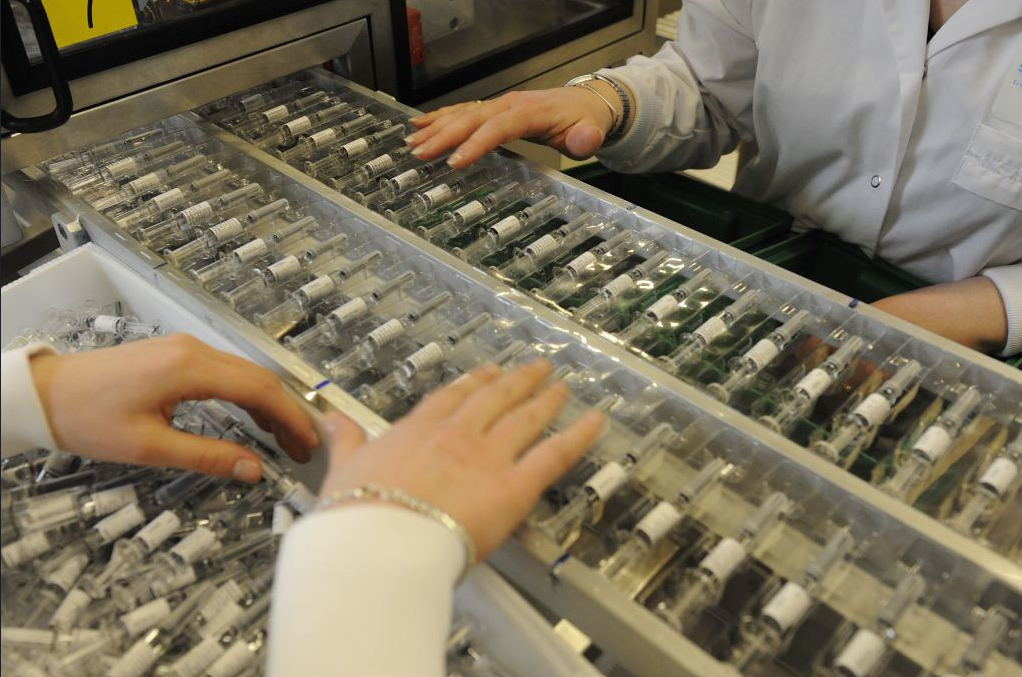Quality Control in bioproduction
Overview of Quality Control practices in bioproduction (efficacy testing, deviation management, microbiological and physicochemical control, etc.).
CURRICULUM
Available in French, English
about 17 hours of content
Curriculum 5
Goals
In summary
Prerequisites
Initial scientific training, initial experience in bioindustries, chemistry, pharmacy, or equivalent in conducting or supervising manufacturing or quality control operations in the health industry.
Alternatively, having completed the introductory course "Discovering the bioproduction plant environment" beforehand.
Alternatively, having completed the introductory course "Discovering the bioproduction plant environment" beforehand.
Course modules
about 17 hours
Quality Control in bioproduction
P5 Initial Evaluation (10 minutes)
Assurez-vous d’avoir répondu au Quiz de
positionnement : Évaluation
initiale avant
de commencer votre parcours.Une fois ce module terminé, vous pourrez passer aux
activités suivantes de votre parcours.
P5M1 Overview of Quality Control (about 2 hours)
This module covers the fundamentals of quality control (QC) in bioproduction, explaining its essential role in biopharmaceutical manufacturing, the types of tests performed, the documents and methods used, as well as sample and deviation management practices.It is based on Good Manufacturing Practices (GMP), quality documentation management standards, and equipment qualification guidelines. The module incorporates tools and methods such as sampling plans, validated control methods, In-Process Control (IPC) monitoring, sample traceability systems, and quality deviation analysis methods.Digital modalities : Activity 1: eLearning / Activity 2 : eLearning / Activity 3 : eLearningTarget audience :Newcomers (technicians, engineers, researchers, and managers) preparing to take up a position in bioproduction or wishing to update their knowledgeStudents and teachers seeking to discover the pharmaceutical industrial environment and the challenges associated with biopharmaceutical production.Support functions (maintenance, regulatory, Quality, HSE, supply chain, Lean, PMO, data) wishing to better understand the fundamentals of bioproduction professionsEmployees in commercial functions, market access, management or partners (suppliers, subcontractors, consultants, investors) not familiar with bioproduction but wishing to better understand the ecosystem and challenges of bioproductionEvaluation procedure :A short evaluation at the end of the module confirming what you have learnt and enabling you to move to the next one (no limit of attempts, 80% of correct answers required).Trainees enrolled in the whole curriculum have the possibility to assess and set their new knowledges and skills via an anchoring quiz between modules
P5M2a Focus on Microbiology (about 2 hours)
Important information: If you choose the accessible version of a 3D or virtual reality activity, please contact the support team to manually unlock the rest of the training.This module explores potential sources of microbiological contamination, methods of prevention and detection, as well as the lifecycle of microbiological samples from their collection to their analysis in the laboratory. It provides the knowledge needed to identify and control contaminants in order to ensure the safety and quality of pharmaceutical products.The module lists and describes the different categories of contaminating microorganisms, their biological characteristics, and their impacts on processes and biopharmaceuticals. Potential sources of contamination—such as raw materials, air, surfaces, personnel, and equipment—are presented, along with the associated routine microbiological tests used to measure bioburden, sterility, and the detection of mycoplasma and endotoxins. Environmental monitoring methods (air, water, surfaces, personnel) in accordance with EU GMP Annex 1 are explained, as well as the references and standards applicable to biocontamination control (GMP, ISO 14644, NF EN 17141).Digital modalities: Activity 1: eLearning / Activity 2: eLearning / Activity 3: Virtual RealityTarget audience : Employees integrating or working in interface with a bioproduction or Quality Control (QC) unit who wishto acquire the fundamentals of QC methods and challenges applied to biopharmaceuticals.Students in life sciences, analysis and control, pharmacy, or chemistry, as well as individuals from academia seeking to understand the industrial environment of biopharmaceutical QC.Employees already specialized (e.g., microbiology, viral safety, physicochemical or immunological testing) who wish to broaden their skills into other areas of QC.Partners (suppliers, service providers, subcontractors) operating in bioproduction or QC.Evaluation procedures : Evaluation at the end of each module to be able to access the next module ( 80% of correct answers required)
P5M2b Focus on Physico-chemistry and Immunology (about 2 hours)
Important information: If you choose the accessible version of a 3D or virtual reality activity, please contact the support team to manually unlock the rest of the training.This module covers the physicochemical and immunological analyses necessary to ensure the quality of therapeutic proteins. It introduces the sources of impurities, their potential impacts on products and patients, and the methods of detecting and quantifying impurities. Practical case studies will provide opportunities to apply the knowledge acquired.It is based on the five fundamental analytical pillars applied to therapeutic proteins (identity, purity, impurities, activity, quantity), the methods associated with each pillar (HP-SEC, cIEF, etc.), techniques for detecting and quantifying impurities at different stages of production (mass spectrometry, liquid chromatography, etc.), as well as best practices for controlling raw materials and starting materials, in connection with contamination prevention and traceability in a GMP environment.Digital modalities: Activity 1: eLearning / Activity 2: eLearning / Activity 3: Virtual RealityTarget audience : Employees integrating or working in interface with a bioproduction or Quality Control (QC) unit who wishto acquire the fundamentals of QC methods and challenges applied to biopharmaceuticals.Students in life sciences, analysis and control, pharmacy, or chemistry, as well as individuals from academia seeking to understand the industrial environment of biopharmaceutical QC.Employees already specialized (e.g., microbiology, viral safety, physicochemical or immunological testing) who wish to broaden their skills into other areas of QC.Partners (suppliers, service providers, subcontractors) operating in bioproduction or QC.Evaluation procedures : Evaluation at the end of each module to be able to access the next module ( 80% of correct answers required)
P5M2c Focus on viral safety and molecular biology tests (about 2 hours)
This module provides an in-depth understanding of the complementary approaches required to ensure viral safety of bioproducts. It introduces molecular biology methods, material selection, viral testing, and viral clearance steps. It is based on the three pillars of viral safety (raw material selection, virological controls, and viral clearance steps), the criteria for selecting raw materials based on their origin and risk profile, virological testing conducted at various stages of the process, detection methods (PCR and RT-PCR), as well as the mechanisms of viral removal and inactivation, primarily applicable to recombinant products.Digital modalities: Activity 1: eLearning / Activity 2: eLearning / Activity 3: Serious Game 2DTarget audience : Employees integrating or working in interface with a bioproduction or Quality Control (QC) unit who wishto acquire the fundamentals of QC methods and challenges applied to biopharmaceuticals.Students in life sciences, analysis and control, pharmacy, or chemistry, as well as individuals from academia seeking to understand the industrial environment of biopharmaceutical QC.Employees already specialized (e.g., microbiology, viral safety, physicochemical or immunological testing) who wish to broaden their skills into other areas of QC.Partners (suppliers, service providers, subcontractors) operating in bioproduction or QC.Evaluation procedures : Evaluation at the end of each module to be able to access the next module ( 80% of correct answers required)
P5 Initial Evaluation (10 minutes)
Assurez-vous d’avoir répondu au Quiz de
positionnement : Évaluation
initiale avant
de commencer votre parcours.Une fois ce module terminé, vous pourrez passer aux
activités suivantes de votre parcours.
P5M1 Overview of Quality Control (about 2 hours)
This module covers the fundamentals of quality control (QC) in bioproduction, explaining its essential role in biopharmaceutical manufacturing, the types of tests performed, the documents and methods used, as well as sample and deviation management practices.It is based on Good Manufacturing Practices (GMP), quality documentation management standards, and equipment qualification guidelines. The module incorporates tools and methods such as sampling plans, validated control methods, In-Process Control (IPC) monitoring, sample traceability systems, and quality deviation analysis methods.Digital modalities : Activity 1: eLearning / Activity 2 : eLearning / Activity 3 : eLearningTarget audience :Newcomers (technicians, engineers, researchers, and managers) preparing to take up a position in bioproduction or wishing to update their knowledgeStudents and teachers seeking to discover the pharmaceutical industrial environment and the challenges associated with biopharmaceutical production.Support functions (maintenance, regulatory, Quality, HSE, supply chain, Lean, PMO, data) wishing to better understand the fundamentals of bioproduction professionsEmployees in commercial functions, market access, management or partners (suppliers, subcontractors, consultants, investors) not familiar with bioproduction but wishing to better understand the ecosystem and challenges of bioproductionEvaluation procedure :A short evaluation at the end of the module confirming what you have learnt and enabling you to move to the next one (no limit of attempts, 80% of correct answers required).Trainees enrolled in the whole curriculum have the possibility to assess and set their new knowledges and skills via an anchoring quiz between modules
P5M2a Focus on Microbiology (about 2 hours)
Important information: If you choose the accessible version of a 3D or virtual reality activity, please contact the support team to manually unlock the rest of the training.This module explores potential sources of microbiological contamination, methods of prevention and detection, as well as the lifecycle of microbiological samples from their collection to their analysis in the laboratory. It provides the knowledge needed to identify and control contaminants in order to ensure the safety and quality of pharmaceutical products.The module lists and describes the different categories of contaminating microorganisms, their biological characteristics, and their impacts on processes and biopharmaceuticals. Potential sources of contamination—such as raw materials, air, surfaces, personnel, and equipment—are presented, along with the associated routine microbiological tests used to measure bioburden, sterility, and the detection of mycoplasma and endotoxins. Environmental monitoring methods (air, water, surfaces, personnel) in accordance with EU GMP Annex 1 are explained, as well as the references and standards applicable to biocontamination control (GMP, ISO 14644, NF EN 17141).Digital modalities: Activity 1: eLearning / Activity 2: eLearning / Activity 3: Virtual RealityTarget audience : Employees integrating or working in interface with a bioproduction or Quality Control (QC) unit who wishto acquire the fundamentals of QC methods and challenges applied to biopharmaceuticals.Students in life sciences, analysis and control, pharmacy, or chemistry, as well as individuals from academia seeking to understand the industrial environment of biopharmaceutical QC.Employees already specialized (e.g., microbiology, viral safety, physicochemical or immunological testing) who wish to broaden their skills into other areas of QC.Partners (suppliers, service providers, subcontractors) operating in bioproduction or QC.Evaluation procedures : Evaluation at the end of each module to be able to access the next module ( 80% of correct answers required)
P5M2b Focus on Physico-chemistry and Immunology (about 2 hours)
Important information: If you choose the accessible version of a 3D or virtual reality activity, please contact the support team to manually unlock the rest of the training.This module covers the physicochemical and immunological analyses necessary to ensure the quality of therapeutic proteins. It introduces the sources of impurities, their potential impacts on products and patients, and the methods of detecting and quantifying impurities. Practical case studies will provide opportunities to apply the knowledge acquired.It is based on the five fundamental analytical pillars applied to therapeutic proteins (identity, purity, impurities, activity, quantity), the methods associated with each pillar (HP-SEC, cIEF, etc.), techniques for detecting and quantifying impurities at different stages of production (mass spectrometry, liquid chromatography, etc.), as well as best practices for controlling raw materials and starting materials, in connection with contamination prevention and traceability in a GMP environment.Digital modalities: Activity 1: eLearning / Activity 2: eLearning / Activity 3: Virtual RealityTarget audience : Employees integrating or working in interface with a bioproduction or Quality Control (QC) unit who wishto acquire the fundamentals of QC methods and challenges applied to biopharmaceuticals.Students in life sciences, analysis and control, pharmacy, or chemistry, as well as individuals from academia seeking to understand the industrial environment of biopharmaceutical QC.Employees already specialized (e.g., microbiology, viral safety, physicochemical or immunological testing) who wish to broaden their skills into other areas of QC.Partners (suppliers, service providers, subcontractors) operating in bioproduction or QC.Evaluation procedures : Evaluation at the end of each module to be able to access the next module ( 80% of correct answers required)
P5M2c Focus on viral safety and molecular biology tests (about 2 hours)
This module provides an in-depth understanding of the complementary approaches required to ensure viral safety of bioproducts. It introduces molecular biology methods, material selection, viral testing, and viral clearance steps. It is based on the three pillars of viral safety (raw material selection, virological controls, and viral clearance steps), the criteria for selecting raw materials based on their origin and risk profile, virological testing conducted at various stages of the process, detection methods (PCR and RT-PCR), as well as the mechanisms of viral removal and inactivation, primarily applicable to recombinant products.Digital modalities: Activity 1: eLearning / Activity 2: eLearning / Activity 3: Serious Game 2DTarget audience : Employees integrating or working in interface with a bioproduction or Quality Control (QC) unit who wishto acquire the fundamentals of QC methods and challenges applied to biopharmaceuticals.Students in life sciences, analysis and control, pharmacy, or chemistry, as well as individuals from academia seeking to understand the industrial environment of biopharmaceutical QC.Employees already specialized (e.g., microbiology, viral safety, physicochemical or immunological testing) who wish to broaden their skills into other areas of QC.Partners (suppliers, service providers, subcontractors) operating in bioproduction or QC.Evaluation procedures : Evaluation at the end of each module to be able to access the next module ( 80% of correct answers required)
P5M3a Applicative module: microbiological tests (about 2 hours)
This module covers sampling processes in production areas, quality control laboratory operations, and the analysis of unexpected results and deviations. It introduces best practices to ensure sample quality, laboratory testing methods, and approaches for managing deviations and implementing effective corrective and preventive actions (CAPA).It is based on the Contamination Control Strategy (CCS), microbiological controls associated with key stages of the manufacturing process (sterility tests, bioburden, endotoxins), simulated aseptic filling procedures (Media Fill Test), environmental monitoring plans (surface, air, personnel), identity and purity tests of bacterial strains, as well as examples of corrective actions in response to contaminant detection.Digital modalities: Activity 1: eLearning / Activity 2: eLearning / Activity 3: Serious Game 2DTarget audience : Employees integrating or working in interface with a bioproduction or Quality Control (QC) unit who wishto acquire the fundamentals of QC methods and challenges applied to biopharmaceuticals.Students in life sciences, analysis and control, pharmacy, or chemistry, as well as individuals from academia seeking to understand the industrial environment of biopharmaceutical QC.Employees already specialized (e.g., microbiology, viral safety, physicochemical or immunological testing) who wish to broaden their skills into other areas of QC.Partners (suppliers, service providers, subcontractors) operating in bioproduction or QC.Evaluation procedures : Evaluation at the end of each module to be able to access the next module ( 80% of correct answers required)
P5M3b Applicative module: physicochemical test and immunoassay (about 2 hours)
This module covers the physicochemical tests required for quality control of therapeutic proteins and cell therapies. It also addresses the management and storage of reference and retention samples, thereby ensuring product safety and efficacy. It helps learners develop practical skills to ensure compliance with regulatory standards.It is based on analytical techniques commonly used for the quality control of therapeutic proteins (HP-SEC, cIEF, CE-SDS), the analysis of critical parameters in cell therapy using flow cytometry, safety and efficacy tests applied to the drug substance (ELISA, Q-PCR, NGS), as well as best practices for the management and storage of reference samples.Digital modalities: Activity 1: eLearning / Activity 2: eLearning / Activity 3: Serious Game 2DTarget audience : Employees integrating or working in interface with a bioproduction or Quality Control (QC) unit who wishto acquire the fundamentals of QC methods and challenges applied to biopharmaceuticals.Students in life sciences, analysis and control, pharmacy, or chemistry, as well as individuals from academia seeking to understand the industrial environment of biopharmaceutical QC.Employees already specialized (e.g., microbiology, viral safety, physicochemical or immunological testing) who wish to broaden their skills into other areas of QC.Partners (suppliers, service providers, subcontractors) operating in bioproduction or QC.Evaluation procedures : Evaluation at the end of each module to be able to access the next module ( 80% of correct answers required)
P5M3c Applicative module: viral safety and molecular biology tests (about 2 hours)
This viral safety module covers manufacturing controls and in-process controls (IPC) for recombinant bioproducts and vaccines. It also addresses sample management and the manufacturer's responsibilities for test quality. It helps develop skills to apply testing strategies and manage samples throughout the production process.It is based on the release tests required for an inactivated viral vaccine, the regulatory requirements for marketing authorization (dual control by the manufacturer and the authority), sample management procedures (traceability, sampling conditions, protocol compliance), as well as the verification of viral inactivation results according to specified acceptance criteria.Digital modalities: Activity 1: eLearning / Activity 2: eLearning / Activity 3: eLearningTarget audience : Employees integrating or working in interface with a bioproduction or Quality Control (QC) unit who wishto acquire the fundamentals of QC methods and challenges applied to biopharmaceuticals.Students in life sciences, analysis and control, pharmacy, or chemistry, as well as individuals from academia seeking to understand the industrial environment of biopharmaceutical QC.Employees already specialized (e.g., microbiology, viral safety, physicochemical or immunological testing) who wish to broaden their skills into other areas of QC.Partners (suppliers, service providers, subcontractors) operating in bioproduction or QC.Evaluation procedures : Evaluation at the end of each module to be able to access the next module ( 80% of correct answers required)
P5M4 Validation of analytical methods (about 2 hours)
This module covers analytical method validation and data integrity in Quality Control. It introduces how to validate methods, manage deviations, and apply data integrity principles to ensure the quality of bioproducts.It is based on the stages of the validation lifecycle (development, validation, routine use, maintenance), performance criteria (precision, accuracy, specificity, linearity, etc.), documentation tools (validation protocol), deviation management methods (5M, impact analysis), as well as ALCOA+ principles to ensure data integrity in a GxP environment.Digital modalities: Activity 1: eLearning / Activity 2: eLearning / Activity 3: eLearningTarget audience : Employees integrating or working in interface with a bioproduction or Quality Control (QC) unit who wishto acquire the fundamentals of QC methods and challenges applied to biopharmaceuticals.Students in life sciences, analysis and control, pharmacy, or chemistry, as well as individuals from academia seeking to understand the industrial environment of biopharmaceutical QC.Employees already specialized (e.g., microbiology, viral safety, physicochemical or immunological testing) who wish to broaden their skills into other areas of QC.Partners (suppliers, service providers, subcontractors) operating in bioproduction or QC.Evaluation procedures : Evaluation at the end of each module to be able to access the next module ( 80% of correct answers required)
P5M5 In vitro, in vivo and ex vivo efficacy tests (about 1 hour)
Important information: If you choose the accessible version of a 3D or virtual reality activity, please contact the support team to manually unlock the rest of the training.This module combines theoretical input with an immersive scenario to explore efficacy testing, its connection to the mechanism of action (MoA), and how to assess the potency of bioproducts. It introduces methods for measuring efficacy, the environmental conditions to be maintained, and best practices to ensure the validity of results.It is based on regulatory requirements for potency testing (validated, MoA-representative, quantitative, and compliant with quality specifications), the different types of efficacy tests (in vitro, ex vivo, in vivo), the analytical methods used, robustness criteria (specificity, sensitivity, accuracy), and the interpretation of results using controls and correlation with patient data.Digital modalities: Activity 1: eLearning / Activity 2: Serious Game 3D Target audience : Employees integrating or working in interface with a bioproduction or Quality Control (QC) unit who wishto acquire the fundamentals of QC methods and challenges applied to biopharmaceuticals.Students in life sciences, analysis and control, pharmacy, or chemistry, as well as individuals from academia seeking to understand the industrial environment of biopharmaceutical QC.Employees already specialized (e.g., microbiology, viral safety, physicochemical or immunological testing) who wish to broaden their skills into other areas of QC.Partners (suppliers, service providers, subcontractors) operating in bioproduction or QC.Evaluation procedures : Evaluation at the end of each module to be able to access the next module ( 80% of correct answers required)
P5M6 Analytical methods: use cases (about 1 hour)
This module offers an immersive scenario centered around a health authority audit, providing a structured exploration of all analytical practices in Quality Control (QC). The audit unfolds in three stages: inspection of sampling in production areas, review of laboratory analyses (microbiology, virology, raw materials), and investigation of unexpected results and quality deviations.It is based on good sampling practices in production areas (traceability, documentation), analytical methods used in virology, microbiology, and raw material laboratories (ELISA, bioburden testing, etc.), deviation management tools (OOS, OOT, CAPA), and the quality investigation approach to ensure batch release within a GMP framework.Digital modalities: Activity 1: Serious Game 2D / Activity 2: Serious Game 2D/ Activity 3 : Serious Game 2DTarget audience : Employees integrating or working in interface with a bioproduction or Quality Control (QC) unit who wishto acquire the fundamentals of QC methods and challenges applied to biopharmaceuticals.Students in life sciences, analysis and control, pharmacy, or chemistry, as well as individuals from academia seeking to understand the industrial environment of biopharmaceutical QC.Employees already specialized (e.g., microbiology, viral safety, physicochemical or immunological testing) who wish to broaden their skills into other areas of QC.Partners (suppliers, service providers, subcontractors) operating in bioproduction or QC.Evaluation procedures : Evaluation at the end of each module to be able to access the next module ( 80% of correct answers required)
P5 Final Evaluation (30 minutes)
Ce
dernier module évalue les connaissances acquises tout au long du parcours à
travers un quiz reprenant des questions issues de l’ensemble des modules de
formation (maximum 3 tentatives, 80% de bonnes réponses requises).
Available in French, English
about 17 hours of content
Curriculum 5
Cookies
By continuing to browse this site, you agree to the use of cookies to optimize your experience and offer you content tailored to your needs. You may object to this use of cookies at any time.
By continuing to browse this site, you agree to the use of cookies to optimize your experience and offer you content tailored to your needs. You may object to this use of cookies at any time.
You can choose what you authorize
Only necessary cookies
Performance cookies
Feature cookies
Personnalisation cookies
Ads cookies

 >
>




